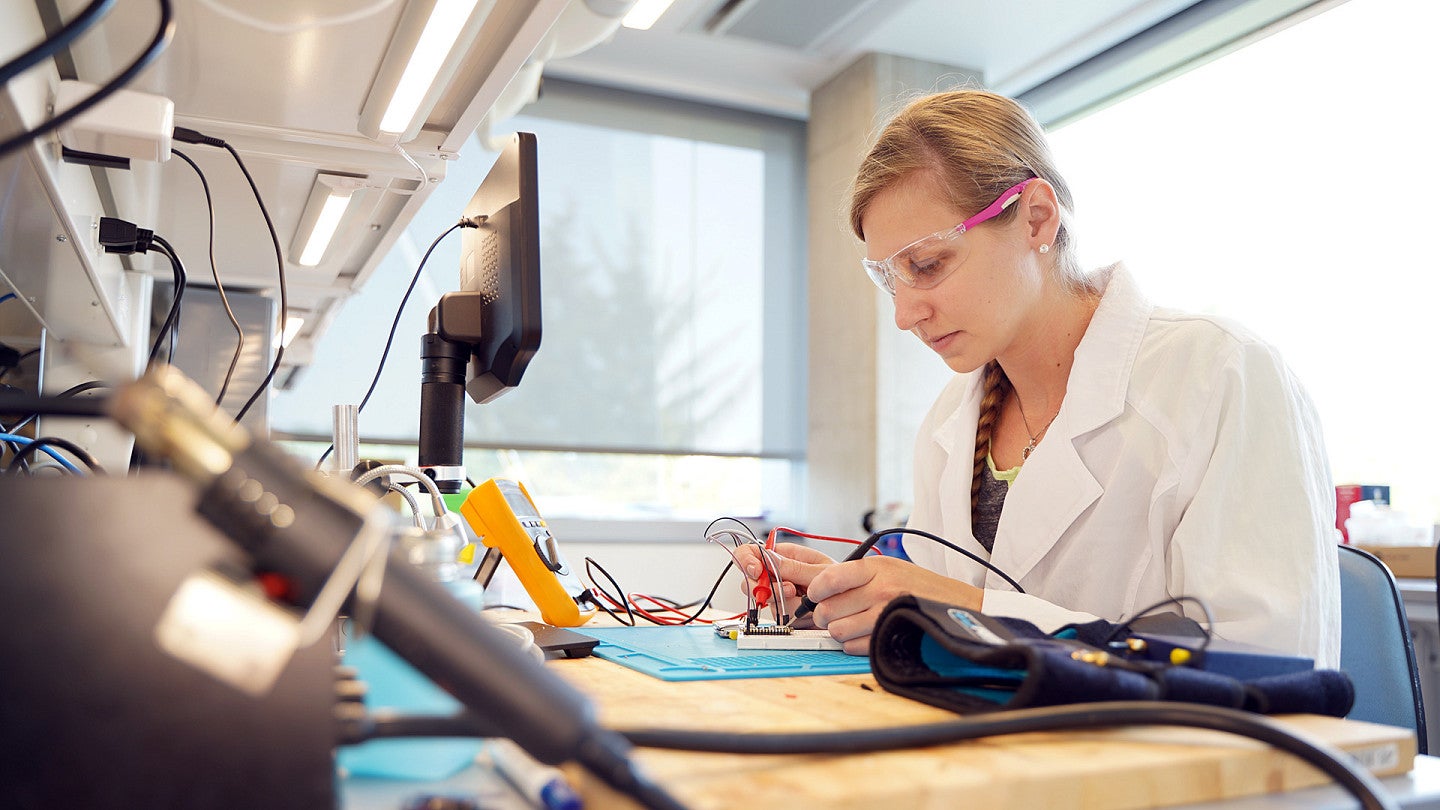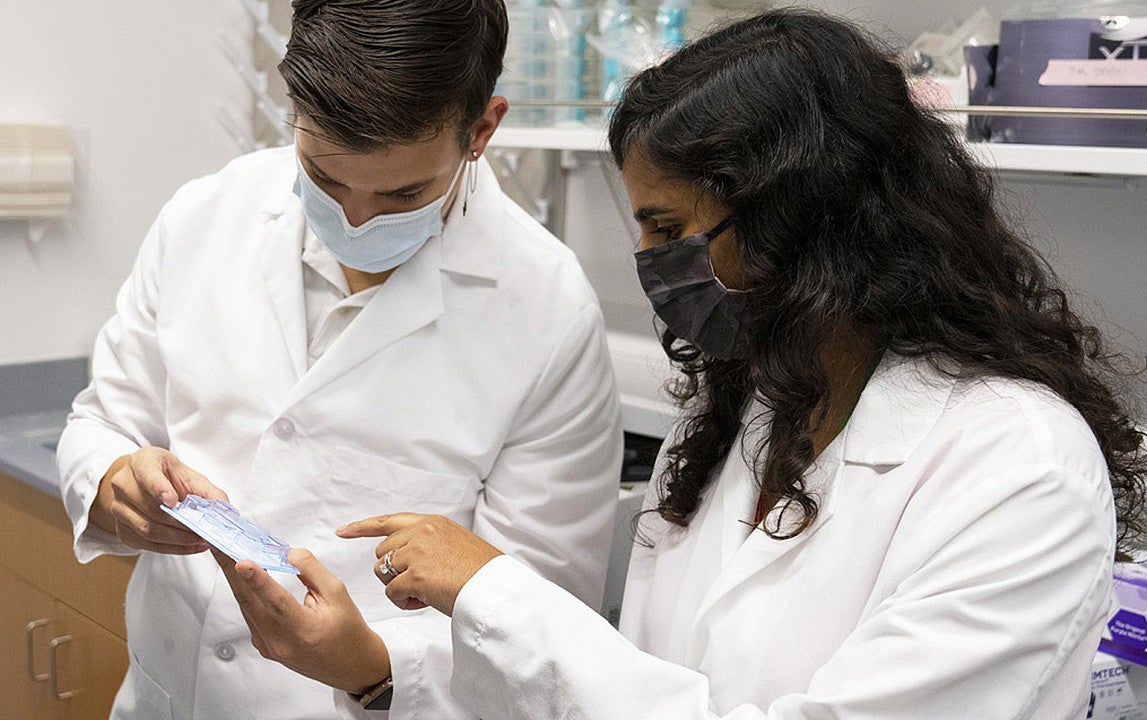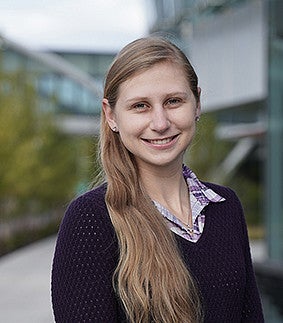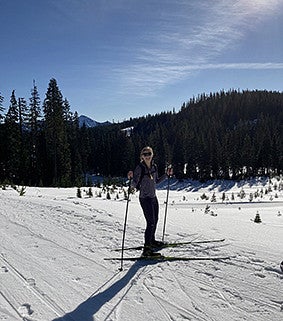
Learn more about the Bioengineering program at Knight Campus.
Knight Campus celebrates three NSF Graduate Research Fellowship recipients in its first three years with Kaylee Meyers' selection in 2023
Kaylee Meyers, one of the second-year students in the Phil and Penny Knight Campus for Accelerating Scientific Impact’s Department of Bioengineering (BioE) PhD program, has been selected for the prestigious Graduate Research Fellowship Program (GRFP) from the National Science Foundation.

"I came to the Knight Campus because I believe in the mission to bring more practicality and translatability into a medical-based engineering learning environment. Personally, I find fulfillment in performing research where I can design and build technologies to help solve problems medical professionals encounter daily and create innovative STEM education programs that will outlive me,” Meyers said.
Meyers works in the Ong Lab at Knight Campus, which focuses on the development of new sensors and devices for medical applications, with emphasis on regenerative medicine for orthopedic care.
Meyers is the third BioE PhD student to be chosen for the Graduate Research Fellowship Program in three years. Other recent winners are Yan Carlos Pacheco (2021) and Jarod Forer (2022). Forer works in the Willett and Hahn labs. Pacheco, the first BioE PhD student to be chosen for a GRFP, works in the Hettiaratchi and Willett labs.
“I think I’m (doing well) because of the people that I work with and constantly interact with,” Pacheco said. “I really have enjoyed the relaxed nature of professors and social aspect that has come with working here. We have had so many different gatherings on the patio in which we just converse and talk about our experiences and sciences. These conversations really have helped to break down barriers between graduate students and professors such that having them accessible has really helped my understanding of research and classes. I also have enjoyed the diverse population of students I constantly work with. From my Cuban lab member to the international students from Switzerland, Iran, and everywhere else, it’s always interesting to take a step back from research and talk about how this new environment is treating us.”
The Knight Campus BioE faculty and staff present a series of workshops each year to help prepare students for the GRFP application process, which is one of many ways the department supports student success. Through a series of four workshops during the summer, our faculty and staff provide support to students as they work on their GRFP, including successful methods to write concise research proposals and writing strong personal statements.

Kaylee Meyers is the third Knight Campus BioE PhD student to be chosen for the Graduate Research Fellowship Program in three years. Other recent winners are Yan Carlos Pacheco (2021), who is part of the first cohort, and Jarod Forer (2022).
Knight Campus Bioengineering's Kaylee Meyers is the third student in the program's first three years selected for the GRFP
Kaylee Meyers, one of the second-year students in the Phil and Penny Knight Campus for Accelerating Scientific Impact’s Bioengineering PhD program, was selected for the Graduate Research Fellowship Program (GRFP) from the National Science Foundation in 2023.
Learn more about Kaylee:

Congratulations on your NSF Graduate Research Foundation Program award. How did that feel to receive the news?
I felt extremely grateful, but also vindicated. The first time I applied for this fellowship I had disparate results with two excellently scored reviews and one pretty negative review. Therefore, I was very happy to be selected for an award and funding this time around.
I received the award notification email around two in the morning and I just happened to be awake because I am a light sleeper. The first thing I did was tell my parents that I had won and then I messaged my mentors to inform and thank them. It took a few hours for me to fall back asleep that night because I was so excited.
What is your area of research expertise?
My graduate research focuses on biosensors and bioelectronics, which involves the development of implantable and wearable sensing platforms. Specifically, my thesis work consists of engineering sensors that fully degrade within the body after their functional lifetime is complete. A lot of the sensors we are developing in the lab are designed to help address complications in sports medicine. I am also involved with some collaborative projects outside of the sports medicine area.

Where are you from?
I grew up in a small, rural community in Michigan where I quickly learned the value of hard work and developed a lifelong appreciation for the outdoors. As a kid I played many different sports and I loved anything that had to do with math and science and enjoyed reading for leisure. I learned many basic engineering concepts hands-on through building and working on things with my dad. My mom started introducing me to anatomy and physiology fundamentals by teaching me all the bones in the human body when I was only six years-old (the skeletal system is our favorite!). I was largely a self-learner in high school who took independent study STEM classes and dual enrolled at a local community college.
What drew you to the Knight Campus?
I came to the Knight Campus because I believe in the mission to bring more practicality and translatability into a medical-based engineering learning environment. When looking for a graduate program, I wanted to maximize the influence of my research on individuals outside the academic community and I felt that the Knight Campus was the best place I could do that at. All the outdoor activities in the area around the Knight Campus also helped in my decision.
What would you tell prospective students about Knight Campus?
With the Knight Campus bioengineering program, I am receiving a unique training experience as the program is heavily focused on shortening the time it takes to translate scientific discovery into meaningful societal impact by complementing instruction in bioengineering concepts with the entrepreneurship and business aspects of STEM technologies. I have been able to continuously work with medical device start-up companies, business programs, patent lawyers, patients, and healthcare professionals during the design process. Also, I am a part of the Women’s Innovation Network and Lens of the Market programs which are allowing me to obtain industry-level entrepreneurship mentoring and continue developing skills related to analyzing market trends, talking with stakeholders, writing grants, and giving business pitches.
I am still getting used to living in the city of Eugene, since I’ve only ever lived in small towns before. I really enjoy the mountains in Oregon, much of my free time is spent mountain biking and cross-country skiing.
How did you get into bioengineering?
My dad is an electrician and my mom is an x-ray technician so bio/biomedical engineering always felt like a great fit for me and has allowed me to explore my many different interests in STEM. When I joined my high school’s robotics team, I quickly figured out I wanted a career in engineering. Robotics provided me with the means to apply design, modeling, and troubleshooting to problems related to our machines. While engaging in robotics I not only began developing the technical, professional, and leadership skills needed in a STEM research career, but I also started learning how to apply these abilities in unique ways to help protect and educate others in my community by designing outreach and safety programs.
What are your career ambitions?
My future goals consist of receiving a Ph.D. in bioengineering with a focus in biosensors to accelerate the development of new medical diagnostic tools as an entrepreneur and become a professor to continue improving and promoting health research and education in STEM for students. Personally, I find fulfillment in performing research where I can design and build technologies to help solve problems medical professionals encounter daily and create innovative STEM education programs that will outlive me.
Meet Knight Campus NSF GRFPs

Kaylee Meyers in 2023
Kaylee Meyers selected for NSF Graduate Research Fellowship Program in 2023, the third Knight Campus Bioengineering student in three years.

Yan Pacheco in 2021
As part of the Bioengineering program's first cohort, Yan Pacheco also became the first Knight Campus student to win a GRF.
